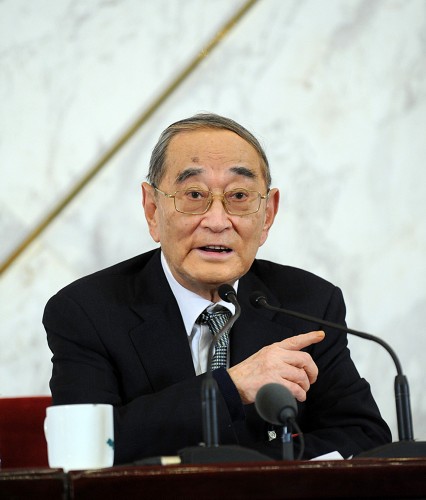Vested interests, inertia 'hard nuts' in China's reform
 0 Comment(s)
0 Comment(s) Print
Print E-mail Xinhua, March 6, 2014
E-mail Xinhua, March 6, 2014
|
|
| Chinese economist Li Yining. [Xinhua photo] |
Renowned Chinese economist Li Yining singled out two "hard nuts" Thursday that impede reform: vested interests and systemic inertia.
Only great determination and courage can assure reform, said Li, a national political advisor, at a press conference on the sidelines of the ongoing annual session of the National Committee of the Chinese People's Political Consultative Conference.
"Economic reform has taken more than 30 years. The situation now is different. All the easy reforms are done and the rest are tough," he said.
A major obstacle is the strong vested interest of those who profit from the status quo, Li said. Further reform, he believes, will undermine their interests.
The next problem is laziness, he said.
"People get set in their ways. New things are always uncomfortable and old ways are always the safest," he said.
In December 2012, when Xi Jinping was the newly-elected general secretary of the Communist Party of China (CPC) Central Committee, he made his first inspection tour outside Beijing to south China's Guangdong Province. It was there that he first mentioned "cracking hard nuts" and "navigating dangerous waters" in a bid to deepen reform.
The terms have lately been borrowed frequently to describe severest challenges ahead.
Li, honorary dean of Guanghua School of Management, Peking University, agrees with Premier Li Keqiang's first government work report Wednesday.
"Like the premier said, to carry on reform, China will need the resolve of a man who must cut off his own snake-bitten hand to save his life," Li said.
Premier Li said in Wednesday's report that the country must rely fully on the people to break "mental shackles and vested interests" with great determination.
The reform will focus on the most wanted areas, the most pressing problems and the sections having the biggest consensus, he said.
The economic restructuring tops Li's list of reforms followed closely by the administrative system, fiscal and tax systems, financial sector, and equal development of state and non-state enterprises.




 Add your comments...
Add your comments...

